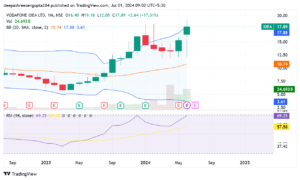Investing in the stock market requires careful consideration and analysis of various factors that influence a company’s performance and potential for future growth. One such stock that has garnered attention is Vodafone Idea (Vi), a major player in the Indian telecommunications sector. This article delves into whether Vi stock is worth buying by examining its financial health, market position, competitive landscape, regulatory environment, and future prospects.
Company Overview
Vodafone Idea Limited, commonly referred to as Vi, was formed through the merger of Vodafone India and Idea Cellular in August 2018. This merger aimed to create a more robust entity capable of competing with market leaders such as Reliance Jio and Bharti Airtel. Vi offers a range of services, including mobile and broadband connectivity, digital solutions, and enterprise services.
Financial Health
Revenue and Profitability
One of the critical factors in determining the viability of investing in Vi is its financial health. Over the past few years, Vi has faced significant financial challenges, primarily due to intense competition and a high debt burden.
The company’s revenue has seen fluctuations, and it has struggled to achieve profitability. As of the latest financial reports, Vi reported a loss, reflecting the ongoing challenges in increasing its revenue base and managing operational costs.
Debt and Liquidity
Vi’s debt situation is another crucial aspect to consider. The company has a substantial debt load, which has been a significant concern for investors. The high level of debt has resulted from network expansion, spectrum purchases, and operational costs.
Vi has been working on restructuring its debt and seeking external funding to improve its liquidity position. The company’s ability to manage and reduce its debt will be pivotal in determining its financial stability and attractiveness to investors.
Market Position and Competitive Landscape
Competitive Environment
The Indian telecommunications market is highly competitive, with major players like Reliance Jio and Bharti Airtel dominating the landscape.
Jio, backed by the financial muscle of Reliance Industries, has disrupted the market with aggressive pricing and innovative services.
Airtel, on the other hand, has maintained a strong market presence through a combination of quality service and strategic investments in technology and infrastructure.
Vi’s Market Share
Vi’s market share has been under pressure due to the aggressive strategies of its competitors. As of recent reports, Vi holds a smaller share of the market compared to Jio and Airtel. However, Vi has been focusing on improving customer experience, expanding its 4G network, and rolling out new digital services to attract and retain customers. The company’s ability to stabilize and grow its market share will be crucial for its long-term success.

Strategic Initiatives
To enhance its competitive position, Vi has undertaken several strategic initiatives. These include partnerships with technology companies to offer bundled services, investments in network expansion, and efforts to enhance customer experience through digital solutions. Vi’s ability to execute these strategies effectively will play a significant role in its ability to compete in the market.
Regulatory Environment
Spectrum Allocation and AGR Dues
The regulatory environment in India has a significant impact on the telecommunications sector. One of the major regulatory challenges faced by Vi is the payment of Adjusted Gross Revenue (AGR) dues.
The Supreme Court of India mandated telecom companies to pay AGR dues, which has added financial strain on Vi. The company has been negotiating with the government for relief measures and extended payment timelines to manage these dues.
Government Policies
Government policies on spectrum allocation, tariffs, and infrastructure development also influence the sector. Any favorable changes in these policies could provide relief to Vi and improve its financial prospects. Investors need to stay informed about regulatory developments and their potential impact on Vi’s operations and financial health.
Future Prospects
5G Rollout
The rollout of 5G technology presents a significant growth opportunity for telecom companies. Vi has been preparing for 5G deployment by upgrading its network infrastructure and participating in spectrum auctions.
The successful launch and adoption of 5G services could enhance Vi’s revenue streams and competitive position. However, the high capital expenditure required for 5G rollout could also add to the company’s financial burden.
Digital Transformation
Vi has been focusing on digital transformation to enhance its service offerings and customer experience. The company has launched various digital services, including Vi Movies and TV, Vi Games, and Vi Business Plus, aimed at diversifying its revenue streams and engaging customers. The success of these initiatives will depend on Vi’s ability to innovate and meet the evolving needs of its customers.
Strategic Partnerships and Investments
Strategic partnerships and investments are crucial for Vi’s growth and sustainability. The company has been exploring collaborations with global technology firms to enhance its service portfolio and leverage new technologies.
Additionally, securing external funding from investors or strategic partners could provide the necessary capital for network expansion and debt reduction.
SWOT Analysis
Strengths
Brand Recognition: Vi benefits from the strong brand recognition of both Vodafone and Idea, which can aid in customer acquisition and retention.
Wide Network Coverage: The company has a broad network coverage across India, providing a solid foundation for expanding services.
Strategic Initiatives: Vi’s focus on digital transformation and strategic partnerships positions it well for future growth.
Weaknesses
High Debt Levels: The substantial debt burden poses a significant risk to Vi’s financial stability.
Market Share Decline: Intense competition has led to a decline in market share, impacting revenue growth.
Regulatory Challenges: Ongoing regulatory issues, including AGR dues, add financial strain and uncertainty.
Opportunities
5G Deployment: The rollout of 5G technology offers potential for new revenue streams and market growth.
Digital Services: Expanding digital services can diversify revenue and enhance customer engagement.
Strategic Investments: Attracting external investments can provide the necessary capital for growth and debt reduction.
Threats
Intense Competition: Aggressive strategies by competitors like Jio and Airtel can further erode Vi’s market position.
Regulatory Risks: Changes in regulatory policies or adverse rulings can impact Vi’s operations and financial health.
Economic Uncertainty: Macroeconomic factors and market volatility can affect consumer spending and investment flows.
Investing in Vi stock presents a mixed bag of opportunities and risks. The company’s financial health, characterized by high debt levels and ongoing losses, is a significant concern. However, Vi’s strategic initiatives in digital transformation, network expansion, and 5G deployment offer potential growth opportunities.
The competitive landscape remains challenging, with market leaders like Jio and Airtel maintaining strong positions. Vi’s ability to stabilize and grow its market share, manage its debt, and navigate regulatory challenges will be crucial determinants of its future success.
For potential investors, a thorough analysis of Vi’s financial statements, market position, strategic initiatives, and regulatory environment is essential.
Those with a higher risk tolerance and a long-term investment horizon might find Vi’s stock an attractive opportunity, given the potential for growth in the telecommunications sector.
However, caution is warranted, and investors should stay informed about ongoing developments and adjust their investment strategies accordingly.
In summary, while Vi’s stock presents potential for growth, it is not without significant risks. Investors should carefully weigh these factors and consider their own risk appetite before making an investment decision.
ALSO READ: Positional Trading: In-Depth Analysis of Key Stocks for June 25




